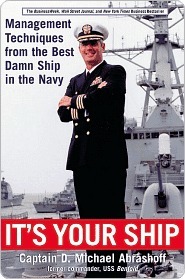More on this book
Community
Kindle Notes & Highlights
Read between
October 24 - November 12, 2019
Show me an organization in which employees take ownership, and I will show you one that beats its competitors.
Empowering means defining the parameters in which people are allowed to operate, and then setting them free.
my job was to create the climate that enabled people to unleash their potential. Given the right environment, there are few limits to what people can achieve.
The difference between thinking as a top performer and thinking like your boss is the difference between individual contribution and real leadership.
If your bosses see you lifting burdens off their shoulders, and they find out they can trust you, they stay out of your face. And that gives you the freedom you need to operate independently and improve your ship.
IT’S FUNNY HOW OFTEN THE PROBLEM IS YOU.
Whenever I could not get the results I wanted, I swallowed my temper and turned inward to see if I was part of the problem. I asked myself three questions: Did I clearly articulate the goals? Did I give people enough time and resources to accomplish the task? Did I give them enough training? I discovered that 90 percent of the time, I was at least as much a part of the problem as my people were.
NEVER FORGET YOUR EFFECT ON PEOPLE.
Leaders need to understand how profoundly they affect people, how their optimism and pessimism are equally infectious, how directly they set the tone and spirit of everyone around them.
As a manager, the one signal you need to steadily send to your people is how important they are to you. In fact, nothing is more important to you. Realize your influence, and use it wisely. Be there for your people. Find out who they are.
NO ONE FOLLOWS A LEADER WHO LIES.
NEVER FAIL THE WASHINGTON POST TEST.
If what I’m about to do appeared on the front page of the Washington Post tomorrow, would I be proud or embarrassed? If I knew I would be embarrassed, I would not do it. If I’d be proud, I knew I was generally on the right track.
OBEY EVEN WHEN YOU DISAGREE.
SEE THE SHIP THROUGH THE CREW’S EYES.
FIND ROUND PEOPLE FOR ROUND HOLES.
USE THE POWER OF WORD MAGIC.
If leaders back their words with action, if they practice what they preach, their words create a self-fulfilling prophecy. Call it “word magic.”
MAKE YOUR CREW THINK “WE CAN DO ANYTHING.”
Secrecy spawns isolation, not success.
leaders need is collective power, and that requires collective knowledge. I found that the more people knew what the goals were, the better buy-in I got—and the better results we achieved together.
OPEN UP THE CLOGGED ...
This highlight has been truncated due to consecutive passage length restrictions.
There was a direct relationship between how much the crew knew about a plan and how well they carried it out.
no matter how fantastic your message is, if no one is receiving it, you aren’t communicating.
AFTER CREATING A GREAT BRAND, DEFEND IT.
FREEDOM CREATES DISCIPLINE.
After Action Review, or AAR.
After every major decision, event, or maneuver, those involved gathered around my chair on the bridge wing and critiqued it.
The ground rules for these sessions were that you checked your ego at the door, and that there was no retribution for any comments.
Free people have a powerful incentive not to screw up.
NEVER PIT DOG AGAINST DOG.
Internal bickering and posturing does nothing for the bottom line.
Trust is like a bank account—you have got to keep making deposits if you want it to grow. On occasion, things will go wrong, and you will have to make a withdrawal.
EVEN THE WORST SCREWUP MAY BE REDEEMABLE.
WELCOME THE BAD-NEWS MESSENGER.
It’s critical that leaders don’t shoot the messenger who brings bad news.
You should never bring petty problems to the attention of your boss if you can solve them yourself. But in critical situations like this one, I advise the opposite. Let him or her know as soon as possible.
Bureaucracies can serve useful purposes. For example, a bureaucracy can slow down the implementation of a bad idea by giving the decision-maker more time to reflect. However, more often than not, bureaucracies create rules and then forget why they were needed in the first place, or fail to see that the reasons for them no longer exist.
rules should be treated as guidelines, not as immutable laws, unless they truly are critical.
The gray areas, in fact, are one reason we need mid-level managers. If everything were black and white, organizations would need only chief executives to make the rules and workers to carry them out without questions.
PROTECT YOUR PEOPLE FROM LUNATIC BOSSES.
Some bosses are heartless yet effective, and you have no choice but to endure them until they self-destruct or retire.
when someone in authority escapes being accountable and feels omnipotent, and it can endanger everyone. An officer or manager is duty-bound to protect his or her people from someone with this problem.
you must somehow help to minimize the damage that this behavior will do to the ship’s well-being or the company’s common interest.
BEING THE BEST CARRIES RESPONSIBILITY.
Helping your boss when he or she needs you badly is a pretty good investment.
TRUST ALSO MAKES MONEY.
HELP KNOCK DOWN THE BARRIERS.
I started eating at least one meal per week on the mess decks with the crew. It paid big dividends; I learned a great deal and got to know people that way,
LET YOUR CREW FEEL FREE TO SPEAK UP.


